JetBrains EdTech Hackathon results
Unfortunately, the May holidays in St. Petersburg were not the sunniest and warmest, but those who took part in the JetBrains EdTech Hackathon were not at all offended to spend 3 days with benefit.
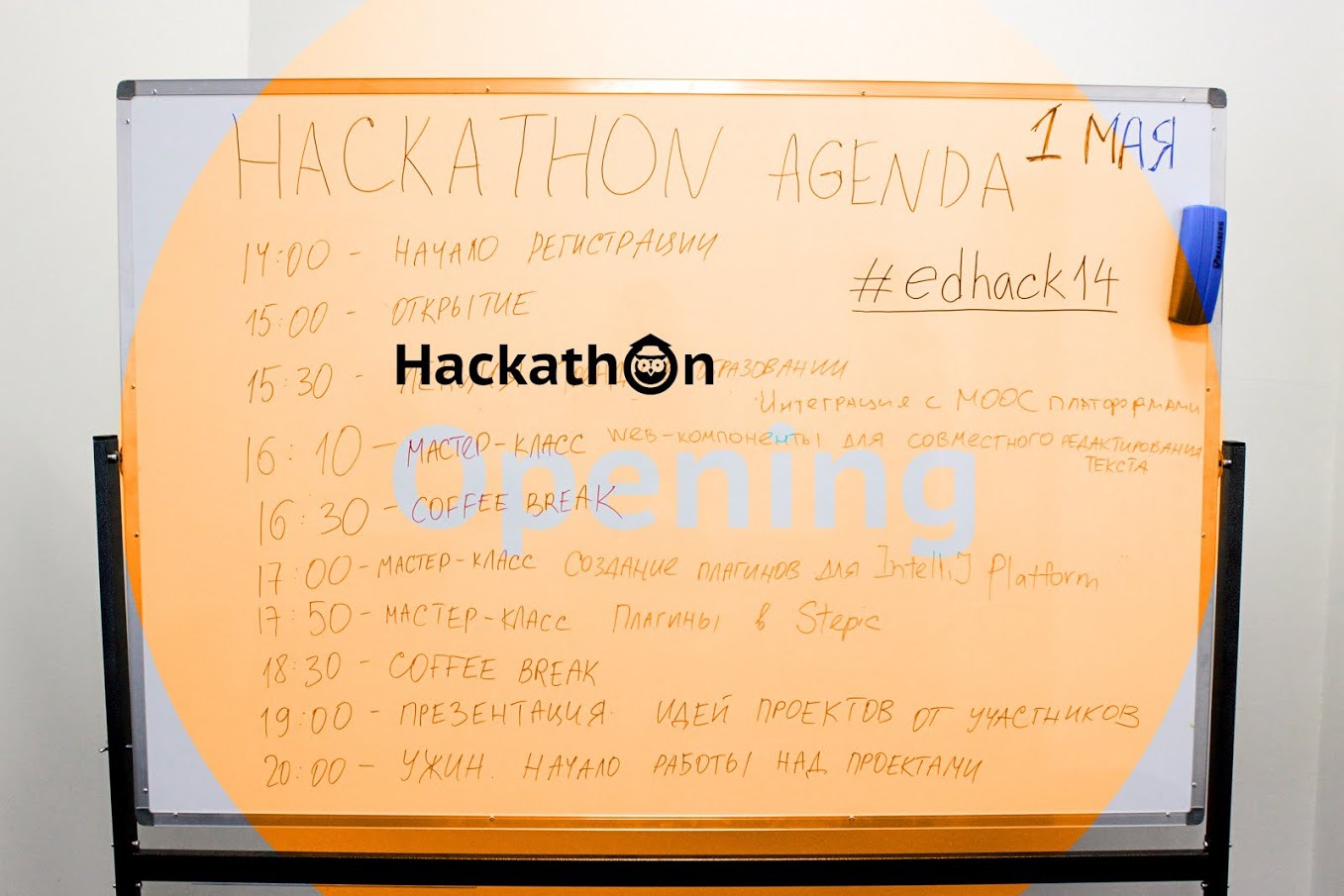
This time, the hackathon’s theme was educational tools. The participants were supposed to focus on software that would facilitate the learning process. It could be services that analyze information from MOOC sites, and their own educational applications, and even plug-ins to existing products aimed at education.
')
One of the main criteria for evaluating concepts was the program code, we initially decided to protect ourselves from business angels, managers, and teams focused on creating fast postcards. The main thing is a working code and a good idea, and everything else takes the hackathon away from its original idea.

78 participants registered in the projects. There were guys from St. Petersburg, many came from Moscow, were from Minsk and even (despite various difficulties) of Ukraine.
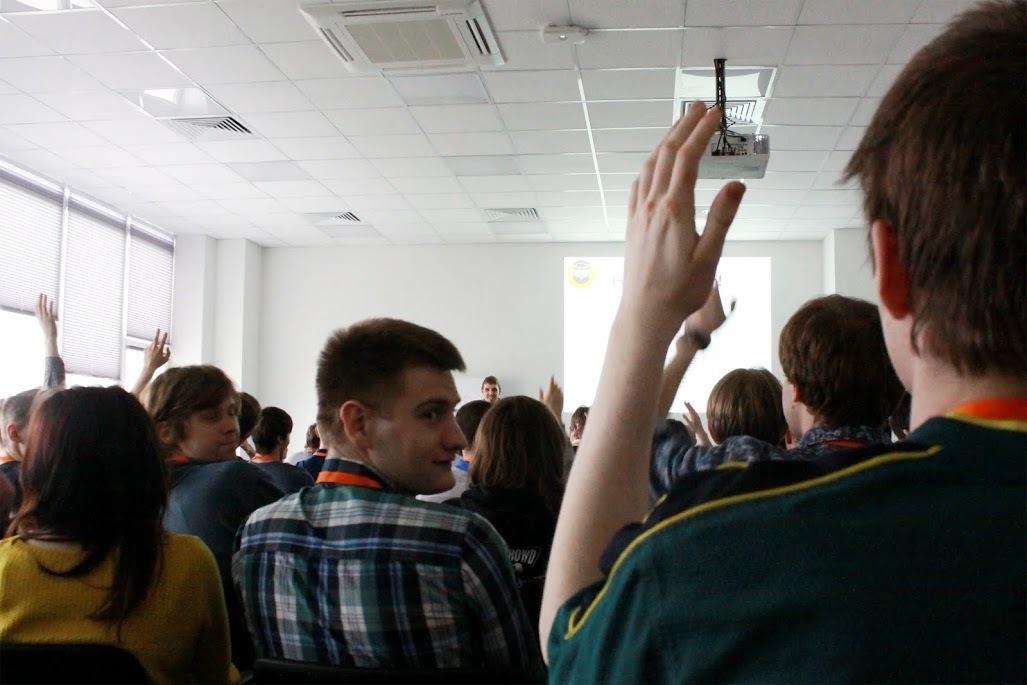
On the first day, 25 projects were presented . Each time such events are admired with their diversity, the participants tried to make online education more social, created platforms for teaching parents, and even tried to put together their own bracelet, tracking how much you are progressing in self-education. I will write about some of them:
The guys from the Teams vs Probems team noticed that most modern educational courses allow a person to pump their own knowledge without using teamwork skills, while in everyday life, many tasks are solved by groups of people. To do this, they created their own platform, which can assemble a separate team for each task.
Continuing the idea of a collective mind, the guys from the MOOCfriends project decided to introduce the participants of the MOOC services in social networks. Thus, with the help of this project, you can not only remotely study a course, but also communicate with your classmates.
The A Pay team has made an application that allows children to receive loans for completed educational courses that can be spent on certain products from the catalog. First you study, and then gingerbread! And both courses and gingerbread parents can choose for themselves.
A similar idea was in the project Study a plus . As conceived by the authors, the child can take online courses, while the time spent on training adds time that can be spent on entertainment.
Apparently, the problem of how and what to teach children in the era of accessibility of online education is becoming more acute. It’s not so easy to navigate in the variety of courses that have appeared There is also no clear understanding of which set of classes will be able to provide training for specific specialists like an offline university.
However, there are areas of knowledge that are not taught in universities, although their importance does not decrease as a result. The ParentsAcademy team decided to create a service that deals with a selection of courses, articles and methods about parenting. After all, before you teach a child, it would be nice to learn.
One of the main tools for mastering international online courses is English. Several projects have been devoted to his study. Separately, I want to highlight the guys from the team Idiom Land . During the Hackathon, they were able to make a prototype of the game, which allows them to study stable expressions in English. The main character in action is a foxy, who happens to be in London, trying to solve his and other people's tasks through communication with local (and not so) residents.

Unfortunately, the engine of this project was made before the hackathon, which did not allow the guys to fully participate in the battle for the prizes. On the other hand, the format of the event allows significant progress in the project, the time limit and participants immersion in the process makes it possible to translate the idea into code in 3 days, while in normal mode it would take a month, and maybe more.
The hackathon itself took place in the second Petersburg office of the JetBrains Times company on Kantemirovskaya. All participants were registered by our wonderful Katya and Karina, who also handed out attributes of the event. The standard participant package consisted of a bag, pen, notebook, stickers and a set of a labor hackatron: slippers, a blindfold, a pillow, and earplugs (which did not appear in the photo).
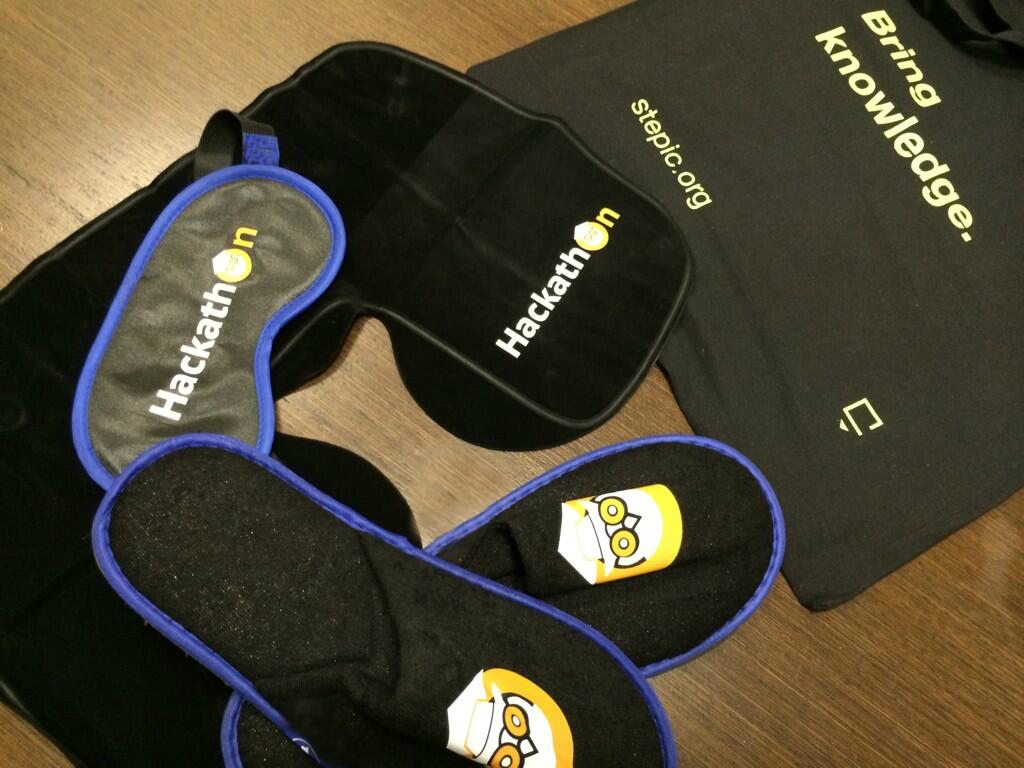
All teams had their own desks, many even worked in separate rooms. We decided that it was necessary to create conditions so that the participants could not leave the office at all throughout the hackathon.
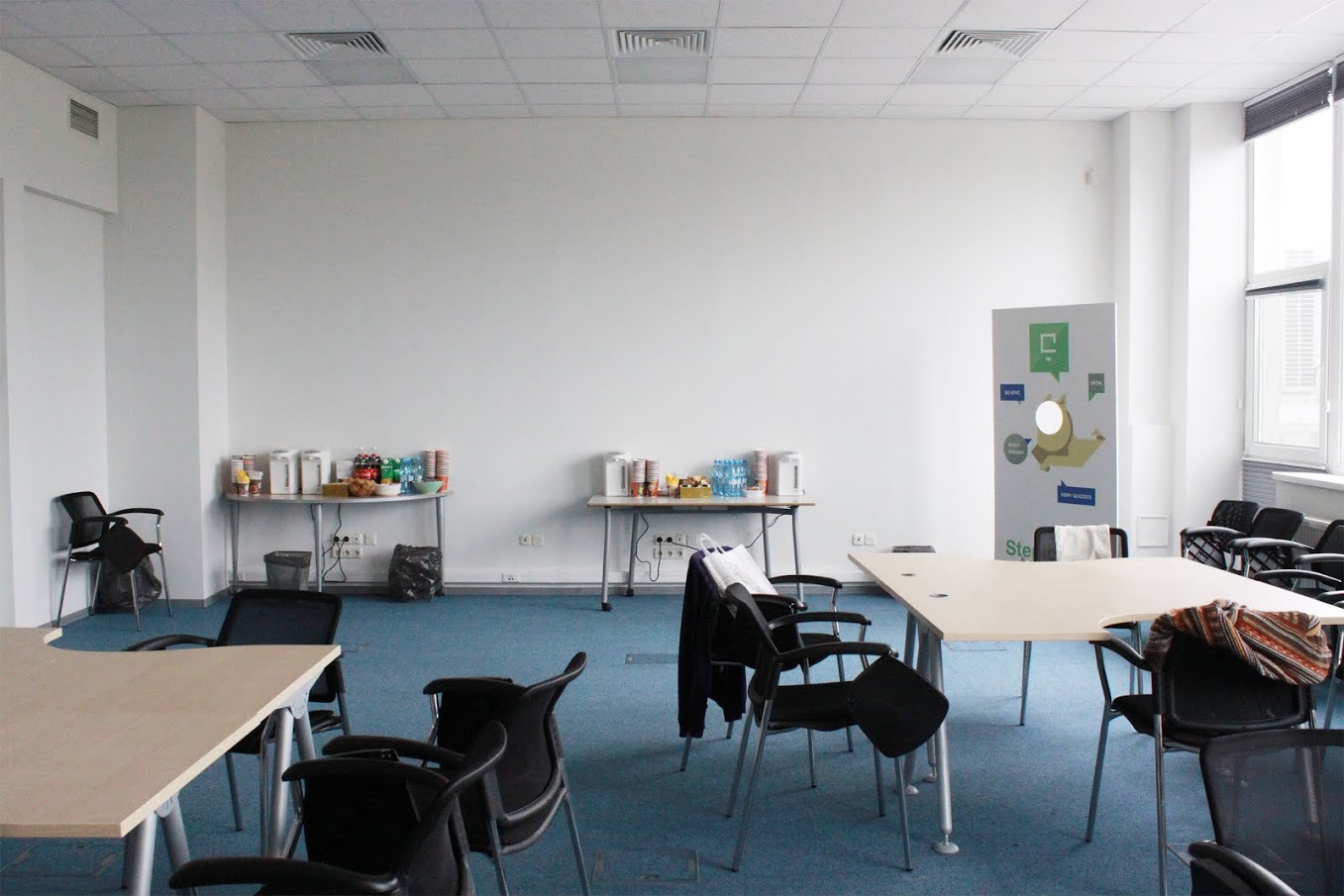
3 meals a day, constant access to snack, shower, toilet and binbegi. Of course this is not a multi-star hotel, but not a few participants remained to spend the night in the office.
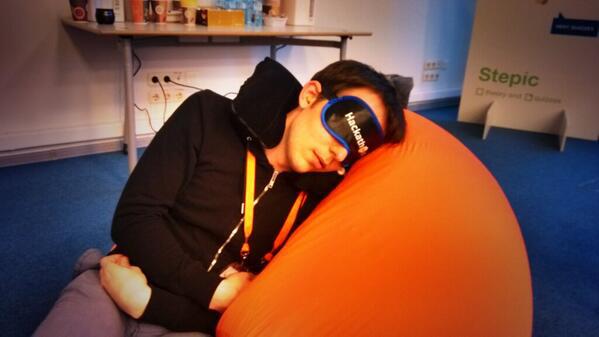
On the morning of the third day, some hackaers moved along the long office corridor like a zombie. And all in order to translate your idea into code. And a few more prizes. For the 3rd place, participants received the Arduino and Raspberry Pi, the Pebble watch took the second place and the Google Nexus tablet won the first place.

Now is the time to say who received these prizes.
Before the award, A Pay projects were separately noted (the jury apparently thought that children in the modern world obviously need to spend time on entertainment no less than on education) and the PPTest project, which allows them to create tests based on Power Point presentations.
3rd place went to CodeTrials - a platform for interactive, short courses on programming languages created by users.
The 2nd place was not occupied, as a result of a long discussion, it was decided to divide the 1st place and the corresponding prizes between the two projects:
A project that allows system administrators to learn. Unfortunately, there are not so many online courses for system administrators. StepicAdmin - a plugin for the Stepic platform, which allows you to raise virtual machines, run scripts in the sandbox and provide users with a real console to a remote machine in a browser, thereby providing tools for the preparation of system administrators.
This project allows you to navigate the diversity of your online courses, recalls new classes, tests, trying to control the overall load. All this is provided with flexible methodologies (according to the authors) and various achivka.
Separately, I would also like to mention the guys from the BrainTracker team, the essence of their project was to create their own system for evaluating the effectiveness of user training, and the necessary metrics should be displayed on a hand-picked bracelet. The guys practically did not leave the office, but the programmer let them down - it burned down at the crucial moment, as a result of which it was not possible to flash the bracelet. Everyone was very sad.
Thank you guys and we wish you never had more such problems.
At the end of our report, I would like first of all to thank once again all the participants in the hackathon - you are great! As organizers, it was especially pleasant for us to spend time with pleasant and smart people, share our knowledge and hear a lot of new things from others, and of course see a wonderful result.
Until new meetings, keep hacking!

Little about the topic hackathon
This time, the hackathon’s theme was educational tools. The participants were supposed to focus on software that would facilitate the learning process. It could be services that analyze information from MOOC sites, and their own educational applications, and even plug-ins to existing products aimed at education.
')
One of the main criteria for evaluating concepts was the program code, we initially decided to protect ourselves from business angels, managers, and teams focused on creating fast postcards. The main thing is a working code and a good idea, and everything else takes the hackathon away from its original idea.

78 participants registered in the projects. There were guys from St. Petersburg, many came from Moscow, were from Minsk and even (despite various difficulties) of Ukraine.

What were the projects
On the first day, 25 projects were presented . Each time such events are admired with their diversity, the participants tried to make online education more social, created platforms for teaching parents, and even tried to put together their own bracelet, tracking how much you are progressing in self-education. I will write about some of them:
Teamwork:
The guys from the Teams vs Probems team noticed that most modern educational courses allow a person to pump their own knowledge without using teamwork skills, while in everyday life, many tasks are solved by groups of people. To do this, they created their own platform, which can assemble a separate team for each task.
Continuing the idea of a collective mind, the guys from the MOOCfriends project decided to introduce the participants of the MOOC services in social networks. Thus, with the help of this project, you can not only remotely study a course, but also communicate with your classmates.
Study for gingerbread
The A Pay team has made an application that allows children to receive loans for completed educational courses that can be spent on certain products from the catalog. First you study, and then gingerbread! And both courses and gingerbread parents can choose for themselves.
A similar idea was in the project Study a plus . As conceived by the authors, the child can take online courses, while the time spent on training adds time that can be spent on entertainment.
Apparently, the problem of how and what to teach children in the era of accessibility of online education is becoming more acute. It’s not so easy to navigate in the variety of courses that have appeared There is also no clear understanding of which set of classes will be able to provide training for specific specialists like an offline university.
However, there are areas of knowledge that are not taught in universities, although their importance does not decrease as a result. The ParentsAcademy team decided to create a service that deals with a selection of courses, articles and methods about parenting. After all, before you teach a child, it would be nice to learn.
About languages
One of the main tools for mastering international online courses is English. Several projects have been devoted to his study. Separately, I want to highlight the guys from the team Idiom Land . During the Hackathon, they were able to make a prototype of the game, which allows them to study stable expressions in English. The main character in action is a foxy, who happens to be in London, trying to solve his and other people's tasks through communication with local (and not so) residents.

Unfortunately, the engine of this project was made before the hackathon, which did not allow the guys to fully participate in the battle for the prizes. On the other hand, the format of the event allows significant progress in the project, the time limit and participants immersion in the process makes it possible to translate the idea into code in 3 days, while in normal mode it would take a month, and maybe more.
How did this happen?
The hackathon itself took place in the second Petersburg office of the JetBrains Times company on Kantemirovskaya. All participants were registered by our wonderful Katya and Karina, who also handed out attributes of the event. The standard participant package consisted of a bag, pen, notebook, stickers and a set of a labor hackatron: slippers, a blindfold, a pillow, and earplugs (which did not appear in the photo).

All teams had their own desks, many even worked in separate rooms. We decided that it was necessary to create conditions so that the participants could not leave the office at all throughout the hackathon.

3 meals a day, constant access to snack, shower, toilet and binbegi. Of course this is not a multi-star hotel, but not a few participants remained to spend the night in the office.

On the morning of the third day, some hackaers moved along the long office corridor like a zombie. And all in order to translate your idea into code. And a few more prizes. For the 3rd place, participants received the Arduino and Raspberry Pi, the Pebble watch took the second place and the Google Nexus tablet won the first place.

About the winners
Now is the time to say who received these prizes.
Before the award, A Pay projects were separately noted (the jury apparently thought that children in the modern world obviously need to spend time on entertainment no less than on education) and the PPTest project, which allows them to create tests based on Power Point presentations.
3rd place went to CodeTrials - a platform for interactive, short courses on programming languages created by users.
The 2nd place was not occupied, as a result of a long discussion, it was decided to divide the 1st place and the corresponding prizes between the two projects:
Stepicadmin
A project that allows system administrators to learn. Unfortunately, there are not so many online courses for system administrators. StepicAdmin - a plugin for the Stepic platform, which allows you to raise virtual machines, run scripts in the sandbox and provide users with a real console to a remote machine in a browser, thereby providing tools for the preparation of system administrators.
Notemooc
This project allows you to navigate the diversity of your online courses, recalls new classes, tests, trying to control the overall load. All this is provided with flexible methodologies (according to the authors) and various achivka.
Separately, I would also like to mention the guys from the BrainTracker team, the essence of their project was to create their own system for evaluating the effectiveness of user training, and the necessary metrics should be displayed on a hand-picked bracelet. The guys practically did not leave the office, but the programmer let them down - it burned down at the crucial moment, as a result of which it was not possible to flash the bracelet. Everyone was very sad.
Thank you guys and we wish you never had more such problems.
Conclusion:
At the end of our report, I would like first of all to thank once again all the participants in the hackathon - you are great! As organizers, it was especially pleasant for us to spend time with pleasant and smart people, share our knowledge and hear a lot of new things from others, and of course see a wonderful result.
Until new meetings, keep hacking!
Source: https://habr.com/ru/post/223131/
All Articles